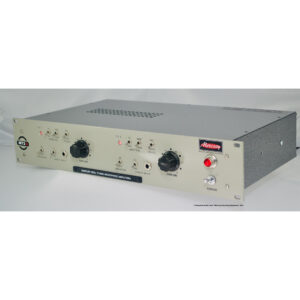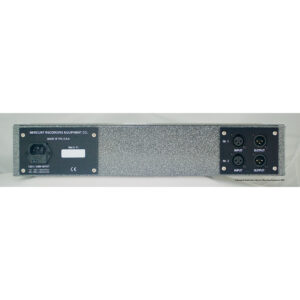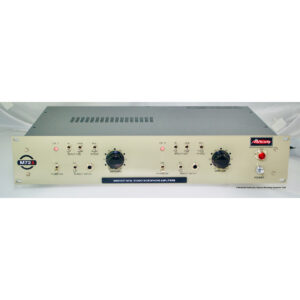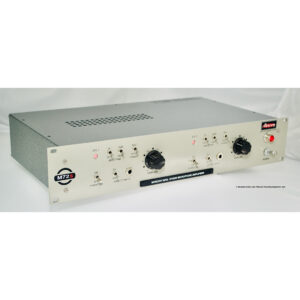“Mercury Recording Equipment M72s MKIV
The new Mercury M72s [Mk. IV] is our flagship, valve Studio Microphone Amplifier. The M72s is based on the most sought after vintage amplifier module—the Telefunken/Siemens V72s—which is most famous for being installed in REDD.37 consoles, used on all the early Beatles recordings by George Martin at Abbey Road Studios in London, England.
You may notice the new Mercury M72s was stripped of a few vintage-inspired, aesthetic extras of the MK II [which is still available as the M72s-CSV, custom shop version] but is still loaded with the same exact tone and warmth utilizing the same exact circuit, same quality parts and same transformers we have used since we started building the first M72s at Mercury Recording Equipment.
The Mercury M72s is based on the module used in consoles which are very rare due to a minimal amount made. The more common V72 amplifier modules (not marked with the lower case s, i.e. V72s) were later modified and have been sold for many years as outboard preamplifiers all over the world. Neither of these amplifier modules have been available new for more than 50 years. So, working units have become extremely rare, very expensive and in some cases are now in need of much repair. Regardless of cost, the uniquely musical tonal characteristics of these amplifiers has made them the prized possession of many engineers lucky enough to get the vintage modules, and a “”secret weapon”” for many studio musicians.
Mercury Recording Equipment is proud to have a faithful reproduction in the M72s. We have 20+ years of experience with the amplifiers and feel we have captured not only how the units behave, but how they sound overall. We are confident with the addition of modern features, making the M72s much more versatile, without sacrificing the most important feature: Musicality.
Key Features:
- Gain variable from 28dB to 58dB, in 3dB increments, controlled with a high-quality rotary switch
- Selectable Input Pad of -16dB or -28dB for more control
- Phantom Power (on/off)
- Phase (Polarity) Reversal
- FDI (FET Direct Input) circuit per channel
- Proprietary J-Fet circuit based on a class-A tube topology
The Mercury M72s has the rich lows and punchy mids giving you that ‘instant’ vocal tone, or assisting with a realistic acoustic guitar tone, punch to bass guitar. The same reaction to instruments or source as the vintage module but with slightly more open high end and openness. The Mercury M72s Studio Microphone Amplifier has that “”vintage”” tone and break up like the original circuit but it is a bit more musical over all (not cleaner, but more musical—there is a huge difference).
” ”
- Mic Input Impedance: Approx. 2k
- Suggested Source Impedance: Approx. 200 ohms
- Input Impedance with -28dB Pad: Approx. 4k
- DI Input Impedance: 2M ohms
- Internal Output Impedance: 30-50 ohms (depends on gain setting)
- Suggested Minimum Load: 500 ohms
- Max. Mic Signal Input Level (@ 20 Hz): +34dBu with -28dB Pad engaged / +6dBu with Pad not engaged
- Max. Output Level: +22dBu
- Frequency Response: 20 Hz to 20 kHz +/- 0.5dB
- Harmonic Distortion: All musically related low orders of harmonics, with no significant order above 5th. **
Mercury Recording Equipment products are not hybrid circuits, emulations of circuits, or “”clones””. We get the same sound, same tone and same musicality because we use the highest quality parts, all the tubes, and especially all the transformers in our products — like the vintage circuits we are paying homage to.
** The actual % of distortion depends on Gain setting. We feel that T.H.D. is not a specification that correlates well with actual “”sonic niceness”” although there are other types of lab tests that seem to fair better in that regard. Anyway, besides the typical (and not so typical) instrumentation lab measurements, we feel that a U.Y.E. (use your ears) test is a very valid approach to achieving our goal.


